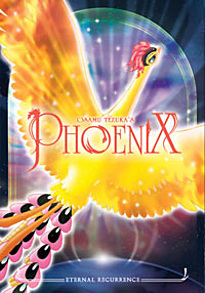Review
by Carl Kimlinger,Phoenix
DVD 2 - Eternal Recurrance
| Synopsis: |  |
||
Leona flees his captors with his robotic lover Chihiro. His flight carries him to his old research facility, jogging his cybernetically damaged memory and informing him that he is not nearly so innocent as he first thought. Sometime deep in Japan's turbulent history, a young samurai murders an ancient healer to prevent her from saving the life of a despotic warlord. The young samurai is trapped upon her death in an alternate dimension, there to learn that punishments exist that are far worse than death and pain. On a long ago battlefield, a member of the defeated nobility is skinned by his enemies, who then graft a wolf's face onto his. Taken by the locals for a monster, he is saved by an old healer woman. In their attempt to bring the young man, soon to be known as Inugami, back to his homeland, the two save the life of defeated general Saruta. When all three arrive in Inugami's homeland, the deformed young man settles in a remote village alongside the friendly local wolf-gods. But the government has adopted a new official religion, Buddhism, and is calling for the abandonment of the old gods. Inugami resists and suffers retribution at the hands of evil Buddhist assassins. Bet you didn't know there was such a thing. |
|||
| Review: | |||
If you were to ask which was preferable, scope or focus, the answer would probably be focus. Nevertheless, you can't help but be impressed by the sheer breadth of Phoenix—by the range of ideas and issues it tackles and the variety of tales it tells. Sin and atonement, religion and politics, inevitable change and the eternal desire to resist it; classic time-travel paradoxes, giant reincarnated noses, and love that transcends the borders between man, machine, god and animal. All of that in four episodes connected by nothing more than the thinnest of thematic threads and with no recurring characters outside of Saruta and his reincarnated schnozz (such is his nose's presence that I'm positive it's reincarnating itself and dragging poor Saruta along with it). However, everything it has in breadth, it lacks in subtlety. Osamu Tezuka makes his points with the finesse of a wrecking ball. No major idea is left unvocalized, no twist of fate or change of heart left alone for viewers to discover of their own volition. His stories are the narrative equivalent of his designs: effective but sometimes exaggerated to the point of caricature. Which is of course only appropriate for a series full of mythic-sized characters, emotions, and dramatic reversals. These are stories occupied more by archetypes than true characters: revenge-consumed young men, kindhearted beast-people, selfless hermits and heartless warlords. Emotions run towards the extreme, tragedy is the order of the day, and divine retribution awaits all who defy the moral order of the universe. This is the world of myth and legend, where one is not meant to expect restraint or to question the efficacy of wolf-face-transplants and robotic brain replacements. For all that they share the ambitions and epic tone of the first volume, this second set of episodes differs in that it makes a few more concessions to viewers' expectations. All of these stories have main characters. Leona in the future arc, Sakon-no-Suke in the hermit(ess) episode, and Inugami in the Inugami episodes. Leona and Inugami both have appropriate (if odd) romantic interests, and all three stories seem to value entertainment almost as much as philosophical exploration. Saruta-proboscis sight-gags recur throughout, and a few action sequences defy all expectation by being downright cool (incongruously studly wolf-man Inugami is hell-on-wheels in a fight). As before, director Ryousuke Takahshi keeps the imagery interesting, and the animation team gives the visuals a vibrant modern look without compromising Tezuka's old-fashioned aesthetic, combining overblown visuals, computer-generated polish and a big, blunt, soaring score to often memorable effect. It's not every tale of crime-and-punishment that can boast a scene in which a flaming phoenix demolishes a moon-base. Where the first volume gave hope that this may be one of Media Blaster's better dubs, this volume cements the possibility. All of the performances are solid, the overall tone of the cast becoming clearer and more confident—ham and excess are advantages in Phoenix and the cast serves up both in generous measure. The English script comfortably balances fidelity to the original with the necessity of conversational flow, though the somewhat awkward formality of the language is actually more appropriate given the source material. The decision to eliminate the preview narration entirely will annoy less tolerant dub fans, but hardly has any noticeable effect on the show overall. And as before the cries of anguish are simply grand. Anything can be forgiven for a good tortured scream. Phoenix's sophomore volume doesn't differ much from its freshman outing—surprisingly involving, nearly biblical adventures built explicitly to explore ideas and questions about life. Perhaps a bit more accessible than before, but no less unconventional. |
| Grade: | |||
|
Overall (dub) : B+
Overall (sub) : B+
Story : B+
Animation : B
Art : B
Music : B+
+ More stand-alone tales in the same larger-than-life vein as the first volume. |
|||
| discuss this in the forum (2 posts) | | |||
| Production Info: | ||
|
Full encyclopedia details about Release information about |
||